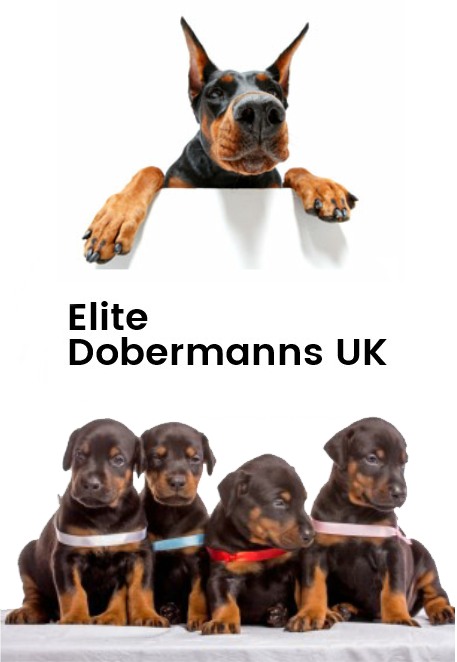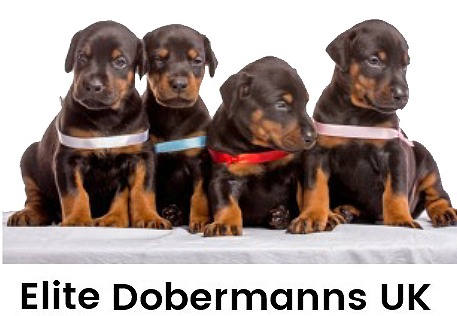General Care

How to care for your Doberman puppy Dietry Requirements
When you receive a puppy from Elite Dobermanns UK they are usually around 3 months and 21 days old. At this age your puppy will be on a diet of solid foods. We advise that you feed your puppy 3 times a day with Royal Canin Maxi Junior dry kibble since this is what the majority of the breeders we work with feed. It is much easier on your puppies’ stomach to remain feeding the same type of food. That said should you wish to give your dog the absolute best dog food available we strongly recommend food from the following 2 brands: Orijin and Cannagans. Should you wish to switch your puppy onto these foods it is advisable to wait until the dog reaches around 6- 8 months old and then gradually introduce the new brand of food.
When our dogs are living with their breeder as soon as they reach the age where they can digest solid foods they are usually fed a mixture of dry kibble, shredded carrot, yoghurt, cottage cheese and cooked meats. The variation and nutritional content of these foods improves the coat, teeth, ears and general health and wellbeing of your puppy. When dealing with a puppy with posted ears it can be helpful to feed a calcium rich diet during the teething stage since calcium is an important ingredient in the cartilage building process – thus helping the ears to stand. When a puppy is teething the calcium is mainly channelled to the teeth. Therefore, increasing the amount of calcium your dog intakes increases the amount of calcium the ears receive leader to a improved standing position of the ears
Water
Always keep fresh water available at all times.
Exercise
Please be aware that as per the FCI international breed standard, our dogs are expected to be athletic and not hyperactive. They do require regular physical activity. This means an enclosed garden or free space that is safe off lead. The dogs we provide enjoy high intensity activity every day and it is up to you to provide the time and space for ball chasing, rolling, sniffing and exploring. A minimum of 2 half hour walks per day in addition to general training is advised although your puppy will enjoy more than this is you are able.
Grooming
Your puppies grooming needs are fairly minimal. Give them a bath when they need it, not too often since they keep themselves fairly clean. Shedding is minimal. Also check for fleas and ticks and use proper preventative/treatment as recommended by your veterinarian.
Nail care is required every week or so depending on the type of exercise you are providing you dog with. This video shows how to use a Dremel to grind a dog’s nails. This is an alternative to clipping your dog’s nails and we think it is the best way to trim a Dobermans nails since the potential for injury is reduced.
Do not forget to check and brush your Doberman’s teeth to avoid dental decay (give bones and hard food to help with good canine dental hygiene).

Handling
Get your Doberman used to having all areas of their body touched/examined. Generally, this is only needed at a young age as with all dogs. It helps for when the veterinarian, show judge, or children touch the dog, they will not be alarmed if the foot is picked up, ears rubbed or teeth examined.
At Home
We really must insist that your Doberman does not live outside. Their short coats are not meant for extreme heat or cold. Some coat types (blue or fawn) are highly sensitive to sun exposure. Our Dobermans have an enormous desire to be with their family. A Doberman left outside will be cold/hot, bored, lonely, and will resort to destructive habits when left outside or confined for too long. Set them up a comfy bed and a crate for their shelter and a private space in the home.
At Home
The attention needs are critical for our Dobermans. They adore human contact and like most dogs, they love to be near you. For a Doberman however it is a little more than that. A Labrador may have an affinity for water, a Collie may be born to herd, a Bloodhound may live to scent and hunt but a Doberman – they live for you, this is one of the main reasons the breed is so popular.
This means their world, their existence, the very fibres of their DNA are engineered to be near you, to be your friend, your constant companion, to read and sense your emotions and that of other people in order that they can appropriately analyse a situation. For this reason, a Doberman is not a good dog for someone who is gone all the time and has little time to devote to their pet.
Your Dobermans will be happy and pretty well content just to be in your presence (sit by your side at the computer, on your lap for a film or on the kitchen floor while you cook) however they need to be acknowledged and interacted with too. Look at them, train them, talk to them, give treats, games or toys, take them in the car and on holiday let them enjoy life by your side. A Doberman really craves your love attention and will repay that in spades.
Training
Our puppies come from work and show titled parents only – this means that our puppies respond extremely well to training. Whether it is basic obedience or full blown protection work our dogs are programmed to be highly receptive to all forms of training. We always advise that you enrol yourself and your new puppy into a basic obedience course – it is fun for you and your dog and helps build a stronger bond between the two of you. We can also provide training up to IPO 3 level should you require it. Please see our protection page for further information.

Veterinarian registration
We strongly advise that you register with your local veterinarian before receiving your new Doberman from us. Whilst there are many things we can assist and advise you on there are some instance where only a veterinarian is qualified to offer advice and perform procedures. We wholeheartedly believe in the mantra, “when in doubt let the professionals sort it out”. If your dog become ill in the first instance it is always good practice to contact your veterinarian.
